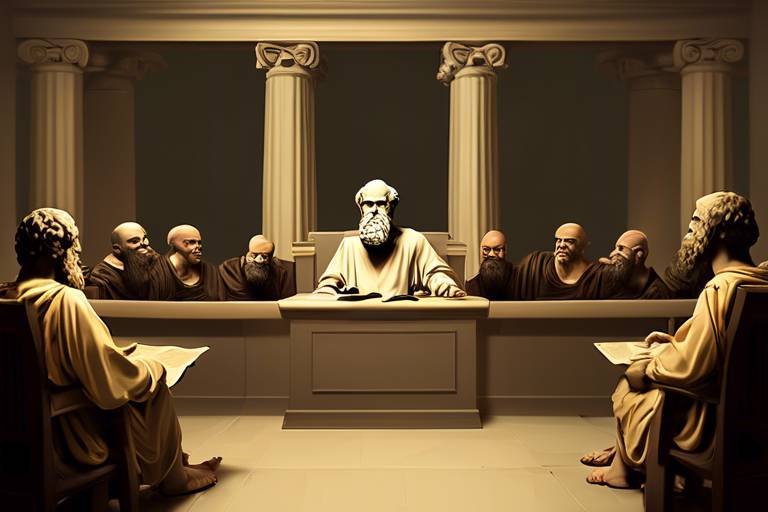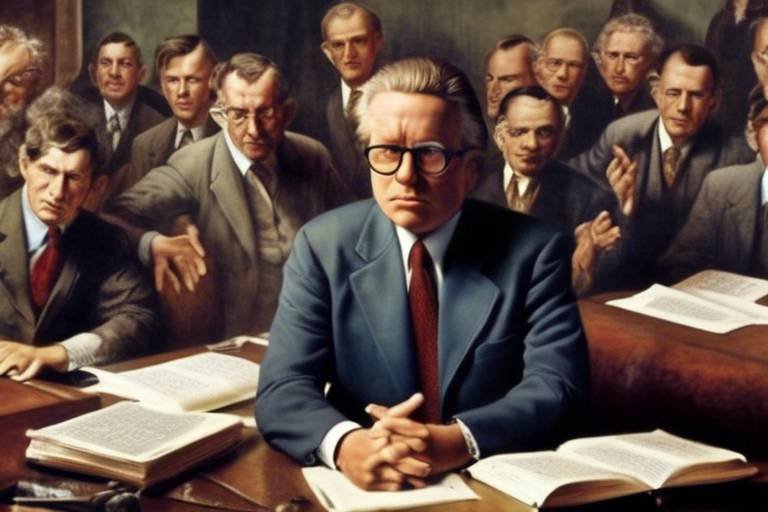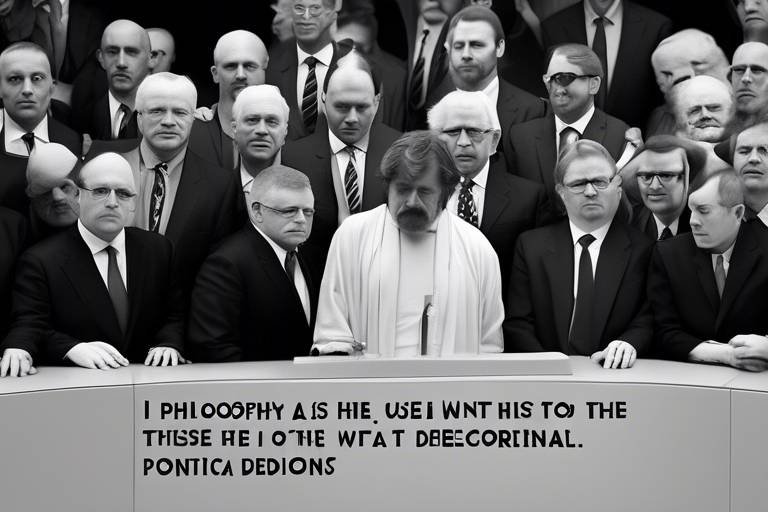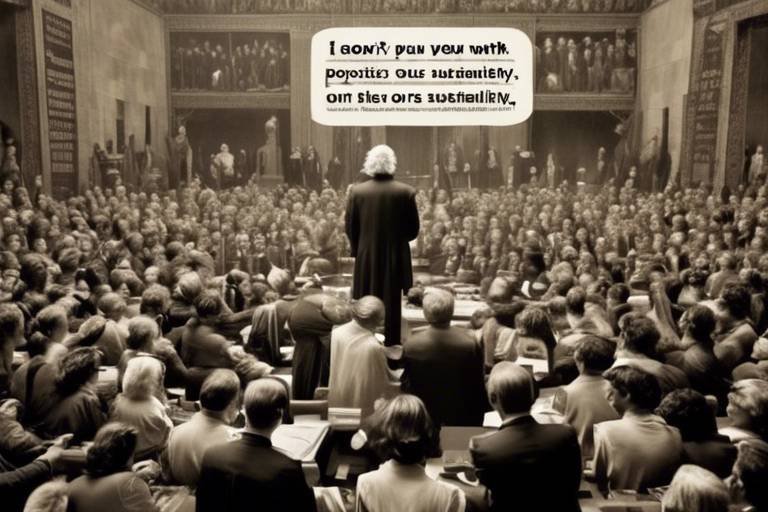Socrates’ Trial - A Political Verdict or Philosophical Inquisition?
The trial of Socrates in 399 BC stands as one of the most significant events in the annals of philosophy and politics. It serves not only as a pivotal moment in the life of one of history's greatest thinkers but also as a reflection of the turbulent political climate of ancient Athens. Was Socrates condemned for his beliefs and teachings, or was the trial merely a political maneuver to silence dissent? This question continues to spark debate among scholars and enthusiasts alike. As we delve into the complexities surrounding Socrates' trial, we uncover layers of political intrigue and philosophical inquiry that resonate even today.
To understand the implications of Socrates’ trial, we must first consider the backdrop against which it unfolded. Athens, a city-state celebrated for its democratic ideals, was also a place rife with political strife and social unrest. The Peloponnesian War had left deep scars, leading to a climate where dissent was often viewed with suspicion. Socrates, with his relentless questioning and challenging of societal norms, became a target in this environment. His method of engaging young minds through dialogue and critical thinking was perceived by some as a threat to traditional values and authority.
As we explore the motivations behind the charges brought against Socrates, it becomes clear that his trial was not merely a legal proceeding but a reflection of broader societal anxieties. The charges of impiety and corrupting the youth were not just accusations; they were emblematic of a society grappling with its identity and values. In this context, Socrates’ philosophical inquiries took on a more dangerous tone, as they questioned the very fabric of Athenian society.
In the following sections, we will dissect the specific charges against Socrates, the role of Athenian democracy in his trial, and the profound philosophical implications that arose from this historic event. By examining these elements, we aim to shed light on whether Socrates’ trial was indeed a political verdict or a philosophical inquisition, and what this means for our understanding of justice and morality today.
- What were the main charges against Socrates? Socrates faced charges of impiety and corrupting the youth of Athens.
- What was the outcome of the trial? Socrates was found guilty and sentenced to death, which he accepted rather than fleeing into exile.
- How did Socrates defend himself during the trial? He employed his dialectical method, questioning the accusers and emphasizing the importance of seeking truth.
- What is the legacy of Socrates' trial? The trial has influenced philosophical thought regarding ethics, justice, and the role of dissent in society.

The Historical Context of Socrates' Trial
To truly understand the trial of Socrates, one must step back into the vibrant yet tumultuous world of ancient Athens. The city was not just a backdrop; it was a living entity filled with political intrigue, social upheaval, and philosophical exploration. During the late 5th century BCE, Athens was basking in the glory of its Golden Age, marked by incredible advancements in art, literature, and democracy. However, beneath this surface of prosperity lay a society grappling with profound challenges. The aftermath of the Peloponnesian War had left Athens in a state of disarray, leading to a climate rife with suspicion and anxiety.
The political landscape was particularly volatile. Following the war, Athens oscillated between democratic ideals and oligarchic rule, creating a breeding ground for dissent. The democratic system, which allowed for the participation of ordinary citizens in governance, also meant that public opinion could easily sway and turn against individuals deemed a threat. In this context, Socrates, with his penchant for questioning established norms and authority, became a target. His method of relentless questioning often left prominent figures feeling exposed and vulnerable, leading many to view him as a destabilizing force.
Moreover, the social fabric of Athens was woven with a deep reverence for the gods and traditional values. The Athenian identity was closely tied to its religious beliefs, which were integral to daily life and civic duty. Socrates' philosophical inquiries often challenged these beliefs, causing unease among those who felt that questioning the divine was tantamount to undermining the very foundation of Athenian society. The charges against him, particularly impiety, were not merely legal accusations; they were reflections of a society wrestling with its own identity and values.
In this charged atmosphere, Socrates' trial was not just about a single man but rather a confrontation between the old and the new, the traditional and the progressive. It was a moment where philosophy clashed with politics, and the implications of the verdict would resonate through the ages. The trial can be seen as a microcosm of Athenian society itself, revealing the tensions between individual thought and collective belief, between the pursuit of truth and the desire for social harmony.
As we delve deeper into the specifics of the charges against Socrates, it becomes evident that these accusations were not merely personal grievances but were deeply intertwined with the political and social currents of his time. Understanding this historical context enriches our comprehension of the trial's significance and its enduring legacy.

The Charges Against Socrates
Socrates, the enigmatic philosopher of ancient Athens, found himself at the center of a storm when he was charged with serious offenses that would ultimately lead to his trial and execution. The two main accusations leveled against him were impiety and corrupting the youth. These charges were not just random grievances; they were deeply rooted in the social and political fabric of Athenian society, reflecting the fears and anxieties of the time.
The charge of impiety was particularly significant. In a city where the gods were integral to daily life and civic identity, Socrates' philosophical inquiries were seen as a direct challenge to the established religious norms. He was accused of not recognizing the gods of the city and introducing new deities. This was a serious allegation in a society that relied heavily on the favor of the gods for prosperity and stability. The Athenian citizens viewed Socrates' questioning of traditional beliefs as a threat to their collective values, which were intertwined with their religious practices.
Furthermore, the notion of corrupting the youth struck a chord with Athenian parents and leaders alike. Socrates was known for engaging young men in dialogue, encouraging them to think critically and question the status quo. This approach, while intellectually stimulating, was perceived as dangerous. Many Athenians believed that Socrates was leading their sons away from the values of their forefathers and instilling in them a sense of skepticism towards authority. In a society that valued obedience and respect for tradition, the idea that a single individual could influence the youth in such a profound way was alarming.
The implications of these charges were far-reaching. They highlighted a clash between traditional values and the emerging philosophical thought that Socrates represented. It was not just about Socrates as an individual; it was about the very fabric of Athenian society. The trial was a reflection of the broader societal concerns regarding the stability of their democratic ideals and the role of dissenting voices within it.
In summary, the charges against Socrates were not merely legal accusations; they were emblematic of a larger struggle within Athenian society. The intersection of political motives and philosophical beliefs played a crucial role in shaping the narrative of his trial. As we delve deeper into this historic event, it becomes evident that the implications of Socrates' trial extend beyond his life, influencing the discourse on morality, authority, and the role of the individual in society.
- What were the main charges against Socrates? Socrates was primarily charged with impiety and corrupting the youth of Athens.
- Why was impiety considered a serious charge? Impiety was seen as a threat to the religious and cultural identity of Athens, as the gods were integral to civic life.
- How did Socrates' teaching methods contribute to his charges? His dialectical approach encouraged critical thinking, which was perceived as undermining traditional values and authority.
- What was the outcome of Socrates' trial? Socrates was found guilty and sentenced to death, a verdict that sparked significant philosophical discussions about justice and morality.

Impiety: A Threat to Athenian Values
The charge of impiety against Socrates was not merely a legal accusation; it was a profound indictment of his very existence and beliefs. In ancient Athens, where the city-state's identity was intertwined with its religious practices, Socrates' unconventional views posed a significant threat to the established order. Athenian society was deeply rooted in its polytheistic beliefs, where gods like Athena and Zeus were not only worshipped but were also integral to civic life. To question these deities or to suggest alternative views was seen as a direct challenge to the social fabric of the city.
Impiety, in this context, was defined by several key factors that were essential to maintaining Athenian values:
- Respect for the Gods: Athenians believed that honoring their gods was essential for the city's prosperity and safety.
- Traditional Practices: Rituals and festivals were crucial in reinforcing community bonds and shared beliefs.
- Civic Duty: Upholding religious customs was often seen as a civic responsibility, intertwining personal faith with public duty.
Socrates, with his method of questioning and his insistence on rational thought, appeared to undermine these values. He famously claimed that he was on a divine mission to seek truth, yet his dialogues often led to skepticism about the gods worshipped by the Athenian populace. This skepticism was perceived as a dangerous seed of doubt that could spread among the youth, further eroding the societal norms that had governed Athenian life for centuries.
Moreover, the implications of impiety extended beyond mere belief. It was about the stability of the state itself. Athenian leaders feared that Socrates' ideas could incite unrest or rebellion against the established order. The trial was, therefore, not just about Socrates as an individual; it was a reflection of the collective anxiety of a society grappling with the tension between tradition and innovation. In a way, Socrates became a scapegoat, representing the existential threat posed by new ideas in a time when Athens was already facing internal strife and external pressures.
In conclusion, the charge of impiety against Socrates was emblematic of a broader struggle within Athenian society. It highlighted the delicate balance between faith and reason, tradition and change. To the Athenians, Socrates wasn't just a philosopher; he was a symbol of a potential upheaval that could challenge their very way of life.
- What was the primary reason for Socrates' trial? Socrates was charged with impiety and corrupting the youth, reflecting both political and philosophical tensions in Athenian society.
- How did Socrates view the gods? Socrates often questioned traditional beliefs about the gods, which led to accusations of impiety.
- What impact did Socrates' trial have on philosophy? The trial sparked discussions on ethics, justice, and the role of the individual in society, influencing future philosophical thought.

Corruption of the Youth: A Societal Concern
The charge of corrupting the youth was not merely a legal accusation; it struck at the very heart of Athenian society's values and fears. In ancient Athens, the youth were seen as the future of the city-state, a generation that would carry forward its ideals, culture, and traditions. When Socrates was accused of corrupting these young minds, it resonated deeply among parents and leaders who were concerned about maintaining the social order. The idea that a philosopher, with his probing questions and radical ideas, could lead the youth astray was alarming and threatened the very fabric of Athenian democracy.
To understand this concern, one must consider the context of Athenian society. The youth were often viewed as impressionable and susceptible to the influences of powerful figures. Socrates’ method of questioning, known as the Socratic Method, encouraged young people to think critically and challenge established norms. While this was a profound educational technique, it also posed a risk of undermining the traditional values that Athenian society held dear. Parents feared that their children might abandon their civic duties or, worse, adopt ideas that could lead to societal upheaval.
Moreover, the notion of corruption was tied to the broader anxieties about the city-state's stability. In the wake of the Peloponnesian War, Athens was grappling with political instability and social unrest. Leaders were particularly sensitive to any dissent that could incite further chaos. Socrates, by questioning the very foundations of morality and governance, became a convenient scapegoat for those in power who sought to deflect attention from their failures. The trial of Socrates thus became a battleground for the ideological struggle between tradition and innovation.
In essence, the accusation of corrupting the youth can be viewed through multiple lenses:
- Parental Anxiety: Parents worried that their children might lose respect for established customs.
- Political Motives: Leaders used the charge to suppress dissent and maintain control over the populace.
- Cultural Identity: The youth were seen as the bearers of Athenian values, and any deviation from this path was viewed as a threat.
Ultimately, the charge of corruption was more than just a legal indictment; it was a reflection of Athenian society's struggle to balance the ideals of democracy with the need for order and conformity. Socrates’ legacy, therefore, invites us to question not just the nature of truth and morality, but also the societal structures that shape our understanding of these concepts. The fear of corruption remains relevant today, as societies continue to grapple with the influence of new ideas and the role of education in shaping future generations.
- What were the main charges against Socrates? Socrates was primarily charged with impiety and corrupting the youth of Athens.
- How did Socrates defend himself during the trial? Socrates employed his dialectical method to question the validity of the charges and highlight the importance of seeking truth.
- What was the outcome of Socrates' trial? Socrates was found guilty and sentenced to death, which he accepted rather than fleeing or recanting his beliefs.

Philosophical Influence: Socrates' Teaching Methods
Socrates was not just a philosopher; he was a master of dialogue and inquiry. His teaching methods were revolutionary for his time and played a significant role in shaping the philosophical landscape of ancient Greece. Instead of delivering lectures filled with dogma, Socrates engaged his students in a process known as the Socratic Method, which emphasized critical thinking and self-reflection. This method involved asking a series of questions that led students to discover answers for themselves, fostering a deep sense of understanding and personal insight.
Imagine sitting in a room filled with eager minds, each waiting for the sage to impart wisdom. Instead, Socrates would pose a thought-provoking question, like, "What is justice?" As the discussion unfolded, he would challenge assumptions and encourage participants to examine their beliefs. This approach not only cultivated critical thinking but also instilled a sense of intellectual humility—the recognition that one might not have all the answers. Through this dialectical process, Socrates aimed to illuminate the truth, guiding his students toward enlightenment rather than simply providing them with information.
However, Socrates' unconventional methods did not sit well with everyone. Many in Athenian society viewed his style as disruptive, particularly because it often led to questioning established norms and values. His penchant for exposing ignorance—especially among the powerful—made him a target for criticism. In fact, the very essence of his teaching method was seen as a threat to the status quo, as it encouraged young minds to think independently and challenge authority.
To further illustrate the impact of Socratic teaching, consider the following key aspects:
- Critical Thinking: Socratic questioning promotes deeper analysis and understanding.
- Self-Discovery: Students learn to find answers within themselves rather than relying solely on external authority.
- Ethical Reflection: Socrates encouraged discussions around morality, pushing individuals to consider the implications of their actions.
In essence, Socrates' teaching methods were not merely educational tools; they were a form of philosophical activism. By encouraging his students to question everything, he ignited a spark of curiosity that would influence generations of thinkers to come. His approach was a catalyst for a broader movement towards rational inquiry and ethical consideration, laying the groundwork for future philosophical discourse.
The philosophical influence of Socrates' methods cannot be overstated. They challenged the very foundations of Athenian society and remain relevant today, reminding us of the importance of questioning, dialogue, and the relentless pursuit of truth. In a world where information is abundant but understanding is often superficial, Socrates' legacy serves as a powerful reminder of the value of thoughtful inquiry and the courage to think differently.
- What is the Socratic Method? The Socratic Method is a form of cooperative argumentative dialogue that stimulates critical thinking through asking and answering questions.
- Why was Socrates put on trial? Socrates was charged with impiety and corrupting the youth of Athens, largely due to his questioning of traditional beliefs and authority.
- What is the significance of Socrates’ teaching methods today? Socrates’ methods encourage critical thinking and self-reflection, which are essential skills in navigating contemporary issues and discussions.

The Role of Athenian Democracy
The trial of Socrates is often viewed through the lens of Athenian democracy, a system that was both revolutionary and fraught with contradictions. At its core, Athenian democracy was founded on the principle of citizen participation. This meant that ordinary citizens had the power to influence decisions, including the fate of someone as significant as Socrates. However, this very system also had its vulnerabilities, particularly when it came to public opinion and the influence of demagogues.
In the context of Socrates' trial, we see a fascinating interplay between democratic ideals and the realities of political tensions. The political landscape of Athens during this time was tumultuous, marked by the aftermath of the Peloponnesian War. The city was grappling with a sense of instability and fear, which made the populace more susceptible to the idea that dissenting voices, like those of Socrates, posed a threat to the democratic fabric.
To understand this dynamic, one must consider the following factors that influenced the proceedings:
- Public Sentiment: The citizens of Athens were often swayed by emotional appeals rather than rational discourse. Socrates' method of questioning and challenging established norms may have been perceived as a direct affront to the values that Athenian democracy sought to uphold.
- Influence of Rhetoric: Skilled orators could manipulate public opinion, leading to a trial that was less about justice and more about maintaining social order. The prosecution's ability to frame Socrates as a disruptor of the youth and a challenger of the gods played a crucial role in swaying the jury.
- Political Climate: The trial occurred in a period of political strife, where the restoration of democracy was still fresh in the minds of the citizens. Socrates' association with controversial figures and his unorthodox views made him an easy target for those looking to reinforce traditional values.
Ultimately, the verdict against Socrates can be seen as a reflection of Athenian democracy's strengths and weaknesses. While the system allowed for civic engagement, it also revealed how easily public opinion could be manipulated. The trial serves as a cautionary tale about the delicate balance between freedom of thought and the pressures of conformity within a democratic society.
In retrospect, Socrates' trial was not merely a legal proceeding; it was a moment that encapsulated the very essence of democracy itself. It raised questions about the role of the individual in society, the nature of justice, and how far a democracy should go to protect itself from perceived threats. As we reflect on this historical event, we are reminded that democracy is not just a system of government, but a complex interplay of ideas, values, and the ever-evolving relationship between the individual and the state.

Philosophical Implications of the Trial
The trial of Socrates was not merely a legal proceeding; it was a profound moment that reverberated through the ages, raising questions that still challenge our understanding of justice, morality, and the role of the individual within society. At its core, the trial was a clash between the established norms of Athenian society and the radical ideas that Socrates championed. His defense, rather than being a simple plea for acquittal, transformed into a philosophical discourse that questioned the very fabric of Athenian democracy and ethical standards. Can one truly uphold their convictions in the face of societal pressure? This is a question that Socrates grappled with, and through his trial, he invited others to do the same.
Socrates famously stated, "The unexamined life is not worth living." This proclamation is not just a catchy phrase; it encapsulates the essence of his philosophy. The implications of his trial extend far beyond the courtroom. They challenge us to reflect on our own lives and the moral choices we make. Are we living authentically, or are we merely conforming to societal expectations? The trial forces us to confront uncomfortable truths about ourselves and our values. It raises the question: What is the price of truth? For Socrates, the cost was his life, yet he viewed this sacrifice as a testament to his beliefs.
Moreover, the trial highlighted the tension between individual conscience and collective norms. Socrates stood as a beacon of critical thought, urging others to question the status quo. This is particularly relevant in today's world, where many face similar dilemmas—whether to conform or to stand up for personal beliefs. The philosophical implications of Socrates' trial resonate deeply with contemporary discussions about freedom of speech and the right to dissent. In a society that often prioritizes conformity over individual thought, Socrates' legacy serves as a reminder of the importance of questioning authority and seeking truth.
Additionally, Socrates' trial raises significant questions about the nature of justice itself. Is justice merely the will of the majority, or is it an objective standard that transcends societal norms? Socrates argued for an ideal of justice that is rooted in virtue and wisdom, rather than popular opinion. This perspective invites us to consider the ethical foundations of our legal systems and societal structures. Are they just, or are they merely reflections of prevailing power dynamics?
In essence, the philosophical implications of Socrates' trial challenge us to engage in a deeper reflection on our own beliefs and societal values. They push us to consider the consequences of our actions and the moral underpinnings of our decisions. As we navigate our lives, we must ask ourselves: Are we willing to stand for what is right, even when it is unpopular? Socrates' trial serves as a timeless reminder that the pursuit of truth and justice often comes at a great cost, yet it is a pursuit that is essential for the growth of both the individual and society.
- What were the main charges against Socrates?
Socrates was charged with impiety and corrupting the youth of Athens, which were serious accusations in the context of Athenian society. - How did Socrates defend himself during the trial?
Socrates used his dialectical method to question the assumptions of his accusers, turning the trial into a philosophical debate about ethics and morality. - What is the significance of Socrates' trial in modern society?
The trial raises important questions about justice, the role of the individual in society, and the importance of free thought and speech, which remain relevant today. - How did Socrates' ideas influence later philosophical thought?
Socrates' emphasis on critical thinking and ethics laid the groundwork for Western philosophy, influencing thinkers like Plato and Aristotle.

Justice and Morality: Socratic Perspectives
Socrates, the quintessential philosopher, had a profound understanding of justice and morality that transcended the norms of his time. His trial not only highlighted the political tensions of ancient Athens but also brought to the forefront his unique views on ethics. Socrates believed that true justice was not merely about adhering to laws or societal expectations but about understanding the essence of virtue itself. He famously stated, “It is better to suffer wrong than to do wrong,” which encapsulates his belief that moral integrity is paramount, even in the face of adversity.
During the trial, Socrates defended his actions by emphasizing the importance of seeking truth and knowledge. He argued that a just society is one where individuals engage in critical thinking and challenge accepted norms. This approach often placed him at odds with the Athenian authorities, who perceived his methods as a threat to the established order. Socrates' dialectical method, often referred to as the Socratic Method, involved asking probing questions that led his interlocutors to discover truths for themselves. This technique not only fostered a deeper understanding of justice but also encouraged a moral examination of one’s own beliefs.
Moreover, Socrates viewed morality as an intrinsic aspect of human existence, arguing that knowledge and virtue are interconnected. He posited that if a person truly understands what is good, they will naturally act in accordance with that understanding. This perspective raises an intriguing question: Can one be just if they lack knowledge? For Socrates, the answer was a resounding no. He believed that ignorance is the root of immorality, and that to be just, one must seek knowledge and strive for a deeper understanding of ethical principles.
In light of these ideas, the implications of Socrates' trial extend far beyond his personal fate. It challenges us to reflect on our own moral compass and the societal structures that govern our understanding of justice. As we ponder the legacy of Socrates, we are reminded that the pursuit of truth and the commitment to ethical living are not merely philosophical pursuits; they are essential to the fabric of a just society. In this sense, Socrates' trial serves as a powerful reminder of the ongoing struggle between individual conscience and societal expectations.
- What was Socrates' view on justice? Socrates believed that justice is rooted in knowledge and virtue, asserting that true justice involves understanding and acting in accordance with ethical principles.
- How did Socrates' trial influence philosophical thought? The trial highlighted the conflict between individual morality and societal norms, prompting deeper discussions on ethics, justice, and the role of dissent in society.
- What is the Socratic Method? The Socratic Method is a form of cooperative argumentative dialogue that stimulates critical thinking and illuminates ideas through asking and answering questions.
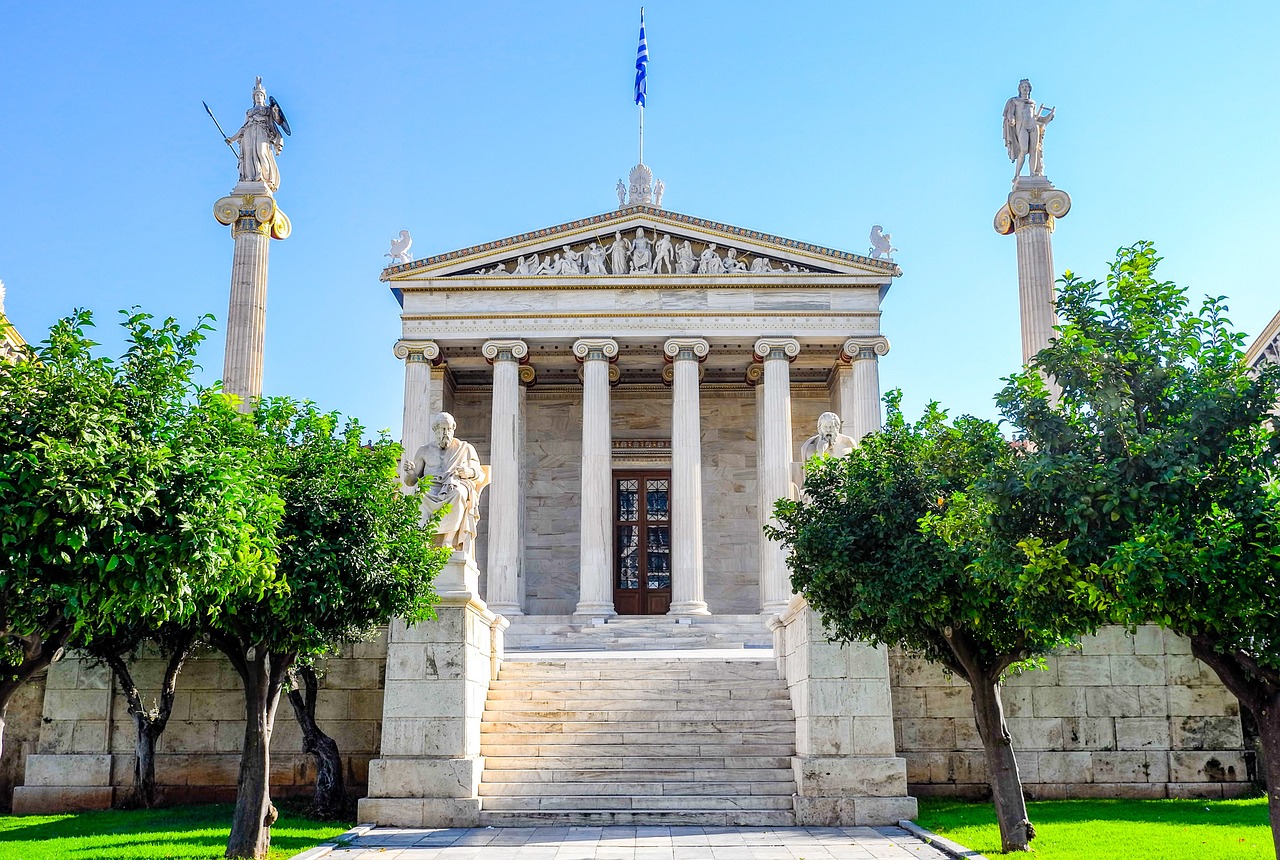
The Legacy of Socrates' Trial
The trial of Socrates in 399 BC is not just a historical event; it is a cornerstone of philosophical inquiry and political discourse that continues to resonate through the ages. Socrates' unwavering commitment to his principles, even in the face of death, has left an indelible mark on the way we understand morality, justice, and the role of dissent in society. His legacy can be seen in various aspects of modern thought, influencing everything from ethical frameworks to political ideologies.
One of the most profound impacts of Socrates' trial is its challenge to the status quo. By standing firm in his beliefs, Socrates became a symbol of the philosophical quest for truth. His method of questioning and dialogue, known as the Socratic method, encourages critical thinking and self-examination. This approach has influenced countless philosophers and educators, shaping the way we engage with ideas and question authority.
Moreover, the implications of his trial extend into the realm of politics. Socrates' execution serves as a cautionary tale about the fragility of democracy and the potential for tyranny within democratic systems. It raises essential questions about the limits of free speech and the responsibilities of citizens in a democratic society. As we navigate political landscapes today, the lessons from Socrates' trial remind us of the importance of protecting dissenting voices and fostering open dialogue.
To further illustrate the ongoing relevance of Socrates' legacy, consider the following aspects:
- Influence on Modern Philosophy: Philosophers such as Plato and Aristotle built upon Socratic ideas, leading to the development of Western philosophy.
- Ethical Frameworks: Socratic thought has been foundational in discussions about ethics, particularly the importance of virtue and the good life.
- Political Discourse: The trial highlights the relationship between the individual and the state, prompting debates about civil liberties and justice.
Ultimately, Socrates' legacy is a testament to the enduring power of ideas. His trial serves as a reminder that the pursuit of truth often comes with significant personal cost, but it is a cost that can lead to profound societal change. As we reflect on his life and the circumstances surrounding his trial, we are prompted to ask ourselves: Are we willing to stand up for our beliefs, even when the odds are stacked against us? This question remains as relevant today as it was over two millennia ago.
- What were the main charges against Socrates?
- How did Socrates defend himself during the trial?
- What is the Socratic method?
- Why is Socrates considered a martyr for philosophy?
Socrates was charged with impiety and corrupting the youth of Athens.
Socrates employed his dialectical method, questioning the accusers and emphasizing the importance of seeking truth.
The Socratic method involves asking a series of questions to stimulate critical thinking and illuminate ideas.
His willingness to die for his beliefs exemplifies the commitment to truth and intellectual integrity that defines philosophical inquiry.
Frequently Asked Questions
- What were the main charges against Socrates during his trial?
Socrates faced two primary charges: impiety, or disrespecting the gods recognized by Athens, and corrupting the youth of the city. These accusations reflected deeper societal fears and political tensions of the time.
- How did the political climate of Athens influence Socrates' trial?
The political landscape of Athens was tumultuous, particularly after the Peloponnesian War. The trial occurred in a democracy that was wary of dissent and critical voices. Socrates' unorthodox views and methods made him a target in a society grappling with its identity and values.
- What is the significance of the charge of impiety?
The charge of impiety was particularly serious in ancient Athens, where religion and civic life were deeply intertwined. Socrates' questioning of traditional beliefs threatened the cultural and religious fabric of Athenian society, making the charge a powerful tool against him.
- How did Socrates' teaching methods contribute to his trial?
Socrates was known for his dialectical method, which involved questioning assumptions and encouraging critical thinking. This approach often challenged the status quo, leading many to view him as a disruptive influence, particularly among the youth.
- What philosophical questions arise from Socrates' trial?
The trial raises essential questions about justice, ethics, and individual rights. It prompts us to reflect on the nature of truth and the role of dissent in a democratic society, highlighting the tension between authority and personal conviction.
- What legacy did Socrates leave behind after his trial?
Socrates' trial and subsequent execution had a profound impact on philosophical thought. His commitment to questioning and seeking truth continues to inspire discussions on morality, authority, and the importance of individual conscience in society.

